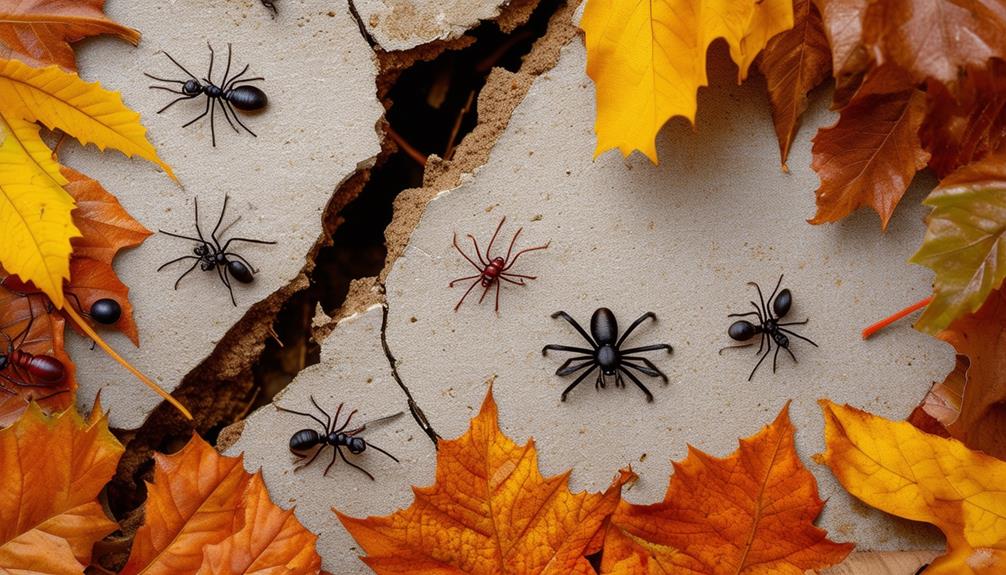Is it better to do pest control yourself?
This question often arises when faced with a pest infestation. While seeking professional pest control services is a common choice, some individuals may consider taking matters into their own hands.
In order to make an informed decision, it is important to assess the extent of the pest infestation, consider one’s DIY skills and knowledge, and weigh the costs and benefits. Additionally, evaluating the risks and safety concerns associated with DIY pest control is essential.
Ultimately, the decision should be based on one’s specific situation, taking into account factors such as the severity of the infestation, the type of pests involved, and the individual’s comfort level in handling such tasks.
When contemplating the question of whether to engage in DIY pest control, it is crucial to first assess the extent of the pest infestation. This involves identifying the type of pests present, determining their population size, and understanding the scope of the problem.
By doing so, one can gauge whether the infestation is manageable and within their capabilities to address. Additionally, considering one’s DIY skills and knowledge is imperative.
If an individual possesses a certain level of expertise in pest control methods, has access to the necessary equipment, and understands the potential risks and safety precautions, they may be more inclined to tackle the issue themselves.
However, it is essential to be realistic and honest about one’s abilities in order to ensure effective pest control and avoid exacerbating the problem.
Assess the Extent of the Pest Infestation
The extent of the pest infestation needs to be accurately assessed in order to determine the most appropriate approach for pest control. Assessing techniques can help identify the severity of the infestation, the type of pests involved, and the areas affected. This information is crucial in order to implement an effective pest control strategy. Without a proper assessment, it is difficult to determine the appropriate measures to take, which may result in ineffective treatments or wasted resources.
While some individuals may consider handling pest control themselves, it is important to recognize the value of professional assistance in assessing the extent of the infestation. Professional pest control experts have the knowledge and experience to accurately evaluate the situation. They are trained to identify signs of infestation that may not be obvious to untrained eyes. Moreover, they have access to specialized tools and techniques that can aid in the assessment process.
By consulting with professionals, homeowners can gain a better understanding of the severity of the infestation and make informed decisions regarding the most appropriate course of action.
Transitioning into the subsequent section about ‘consider your DIY skills and knowledge’, it is essential to take into account your own abilities and expertise when it comes to pest control. Assessing the extent of the infestation is just one aspect of the process, and it is important to consider whether you have the necessary skills and knowledge to effectively handle the situation on your own.
Consider Your DIY Skills and Knowledge
When considering whether to do pest control yourself, it is important to research and gather information about the specific pest infestation you are dealing with.
Understanding the habits and behaviors of the pests can help you determine whether your DIY skills and knowledge are sufficient for effective control.
Additionally, evaluating your capabilities and comfort level is crucial as some pest control methods may require physical strength, technical expertise, or the use of chemicals that may pose risks if not handled properly.
Research and gather information
To thoroughly evaluate the effectiveness of DIY pest control, it is essential to conduct comprehensive research and gather relevant information. Research holds great importance when it comes to pest control as it allows individuals to understand the nature of pests, their behavior, and effective control methods.
By delving into scientific studies, expert opinions, and reputable sources, one can gain a deeper understanding of the various pest control techniques available and their potential efficacy. Additionally, research can provide insights into the potential risks and side effects associated with certain pest control products or methods, allowing individuals to make informed decisions based on their unique circumstances.
Information gathering is equally crucial in the process of DIY pest control. By gathering information about the specific pests one is dealing with, their habits, and the extent of the infestation, individuals can develop a targeted and effective pest control plan. This could involve identifying the specific type of pest, such as ants, termites, or rodents, and learning about their life cycles, preferred habitats, and common entry points into homes. Understanding these details enables homeowners to adopt preventive measures and implement appropriate control strategies.
By conducting thorough research and gathering relevant information, individuals can equip themselves with the necessary knowledge to make informed decisions about DIY pest control.
Transitioning into the subsequent section, it is important to evaluate your capabilities and comfort level to determine if DIY pest control is the right approach for you.
Evaluate your capabilities and comfort level
Evaluating one’s skills and level of comfort is essential in determining the suitability of DIY pest control. How capable and confident are you in handling pest control tasks?
Before embarking on a do-it-yourself approach, it is crucial to conduct a thorough capabilities assessment. This assessment involves assessing your knowledge about pests, their behaviors, and the appropriate control methods. It also requires evaluating your ability to identify different types of pests and their signs, as well as understanding the potential risks associated with pest control chemicals.
Additionally, a comfort level evaluation is necessary to gauge your comfort with handling pests and potential encounters with them. Some individuals may be apprehensive about dealing with pests directly, especially those that pose health risks or cause discomfort.
Moreover, considering the potential challenges and physical demands of certain pest control tasks is essential. For example, climbing ladders to access high infestation areas or working in confined spaces may require a level of physical strength and agility.
By conducting a capabilities assessment and comfort level evaluation, you can make an informed decision about whether DIY pest control is suitable for you. Once these evaluations are complete, it is important to weigh the costs and benefits of taking on the task yourself.
[Sentence transition to the subsequent section]
Weigh the Costs and Benefits
Considering the costs and benefits is essential when deciding whether to take on pest control yourself.
One of the main factors to consider is cost effectiveness. Hiring a professional pest control service can be expensive, especially if you have recurring pest problems. On the other hand, doing it yourself can save you a significant amount of money. You can purchase pest control products and equipment at a fraction of the cost of hiring a professional. Additionally, you can use these products multiple times, which further enhances the cost effectiveness of doing it yourself.
Another aspect to consider is the effectiveness versus convenience. While professional pest control services have the expertise and experience to handle any pest issue effectively, doing it yourself can also yield positive results. There are many effective pest control products available in the market that can help you eliminate pests from your home. However, it is important to note that the effectiveness of DIY pest control depends on the severity of the infestation and your knowledge of pest control techniques. If you have a minor pest problem, doing it yourself can be a convenient and effective option. However, for more complex or severe infestations, it may be more beneficial to seek professional help.
Transitioning into the subsequent section about ‘evaluate the risks and safety concerns’, it is important to not only weigh the costs and benefits but also evaluate the risks and safety concerns associated with DIY pest control.
Evaluate the Risks and Safety Concerns
This discussion will focus on evaluating the risks and safety concerns associated with pest control.
It is important to understand the potential health hazards that may arise from pest control activities, such as exposure to harmful chemicals or the spread of diseases carried by pests.
Additionally, consideration should be given to the use of chemicals and pesticides, as their improper application or overuse can have detrimental effects on human health and the environment.
Understand potential health hazards
Potential health hazards associated with pest control should be thoroughly understood before deciding whether to undertake the task oneself. It is important to be aware of the potential risks and take necessary safety precautions to avoid any adverse effects on health. Exposure to certain pesticides and chemicals used in pest control can lead to various health problems, including respiratory issues, skin irritation, eye damage, and even more severe conditions such as cancer or neurological disorders. Therefore, before opting for DIY pest control, individuals should carefully assess their ability to handle these hazards and ensure they have the necessary knowledge and protective equipment to minimize the risks involved.
To better understand the potential health hazards associated with pest control, it is useful to consider a comparison of the risks involved with different pest control methods. The following table presents an overview of the health risks associated with various pest control techniques:
| Pest Control Method | Health Risks | Safety Precautions |
|---|---|---|
| Chemical Pesticides | Respiratory issues, skin irritation, | Follow instructions carefully, use |
| eye damage, long-term health risks | protective clothing and equipment | |
| Biological Control | Minimal risks to humans | Follow proper handling and disposal |
| procedures | ||
| Physical Control | Physical injuries, strains, | Use appropriate tools and personal |
| allergies | protective equipment |
Understanding these potential health hazards and the corresponding safety precautions is vital in making an informed decision about whether to undertake pest control oneself. Considering the risks involved with chemical pesticides, it becomes crucial to explore alternative methods that minimize the use of such substances. Therefore, it is important to transition into the subsequent section about considering the use of chemicals and pesticides while evaluating the risks and safety concerns associated with DIY pest control.
Consider the use of chemicals and pesticides
Chemicals and pesticides are commonly used in pest control to eliminate and prevent infestations. However, it is essential to consider the potential health hazards associated with their use. Exposure to these chemicals can lead to various health issues, ranging from mild irritation to serious respiratory problems and even long-term effects on human health.
It is important to understand the potential risks involved before deciding to use chemical pest control methods.
When considering the use of chemicals and pesticides for pest control, it is crucial to explore chemical-free alternatives. There are numerous natural and non-toxic methods available that can effectively control pests without the use of harmful chemicals. These alternatives include using traps, barriers, and natural repellents, as well as implementing proper sanitation practices to minimize pest attraction.
Utilizing chemical-free alternatives not only reduces the risk of potential health hazards but also promotes a safer environment for both humans and pets.
To ensure the effective and safe use of chemicals and pesticides, it is recommended to seek professional expertise. Pest control professionals have the knowledge and experience to identify the specific pest problem, determine the most appropriate treatment, and apply the chemicals in a controlled and targeted manner. They are trained in the safe handling and application of pesticides, minimizing the risks associated with their use. Additionally, professionals can provide guidance on preventive measures and long-term pest management strategies, reducing the likelihood of future infestations.
Considering the potential health hazards and the availability of chemical-free alternatives, as well as the benefits of professional expertise, it is crucial to make an informed decision based on your specific situation.
The subsequent section will delve into factors to consider when deciding the best approach to pest control, taking into account individual circumstances and preferences.
Decide Based on Your Specific Situation
Deciding whether to do pest control yourself should be based on a careful evaluation of your specific situation, allowing you to make an informed decision that ensures the well-being of your home or business. Assessing the risks associated with pests and the effectiveness of the available control methods is crucial in determining whether you should handle the pest control yourself or seek professional help.
To make this evaluation, it is important to consider the type and severity of the pest infestation. Some pests, such as ants or small insects, may be effectively controlled using DIY methods such as baits or sprays available in the market. However, for more complex or extensive infestations, it is advisable to seek professional help. Professionals have the knowledge, skills, and access to specialized equipment and pesticides that may not be readily available to the general public. They can effectively assess the extent of the infestation, identify the underlying causes, and implement appropriate control measures to eliminate the pests and prevent future occurrences.
In addition to the severity of the infestation, other factors such as the size of the property and the potential health risks associated with the pests should also be considered. If you have a large property or if the infestation poses health risks, such as the presence of venomous spiders or disease-carrying rodents, it is best to consult a professional pest control service. They can safely handle the situation, minimizing the risks to you, your family, or your employees.
While DIY pest control may be suitable for minor infestations, it is essential to assess the risks and severity of the infestation before deciding whether to handle it yourself or seek professional help. Professional pest control services have the expertise and resources to effectively address complex or extensive infestations, ensuring the well-being of your property and the safety of its occupants.
Frequently Asked Questions
How can I determine the severity of a pest infestation in my home?
Determining the severity of a pest infestation in one’s home requires a professional assessment. By relying on their expertise, individuals can accurately gauge the extent of the problem and make informed decisions regarding pest control measures.
What are some key factors to consider when assessing my DIY skills and knowledge for pest control?
When assessing skills and knowledge for DIY pest control, key factors to consider include understanding pest behavior, knowledge of appropriate control methods, access to necessary tools and materials, and the ability to implement control measures effectively and safely.
Besides the costs, what are some other benefits of doing pest control myself?
Benefits of doing pest control yourself include cost savings, greater control over the process, and the satisfaction of successfully solving the problem. DIY methods can be effective when executed properly and with the right knowledge.
What are the potential risks and safety concerns associated with DIY pest control methods?
When considering DIY pest control, it is crucial to acknowledge the potential risks and safety concerns. These methods may expose individuals to harmful chemicals, pose fire hazards, and require proper knowledge and protective equipment to ensure personal safety.
Are there any specific situations where it is generally recommended to hire professional pest control services instead of doing it yourself?
Situations requiring professional pest control services include severe infestations, complex pest problems, and the presence of hazardous pests. Hiring professionals ensures effective and safe solutions, specialized knowledge, and access to professional-grade products and equipment.





